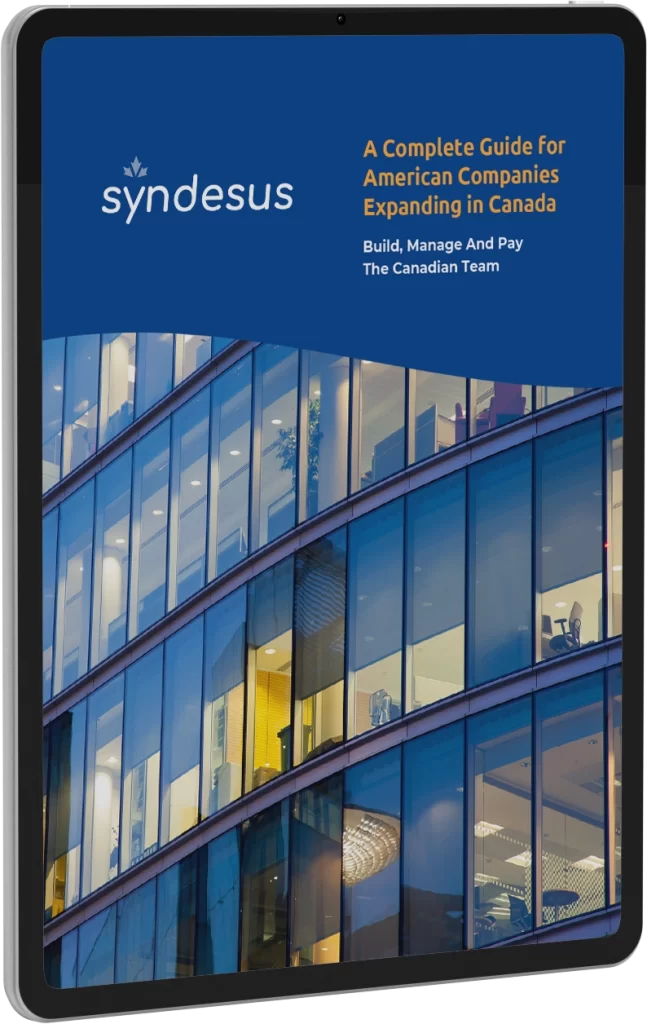For decades, working in technology meant calling Silicon Valley home, but since the start of the pandemic, the increase in remote work has dispersed the industry further than ever before and increased the migration of tech workers around the world.
American workers are heading to Canada for jobs, and international talent who might have pursued an H-1B visa in the past are now looking north for Global Talent Stream access to Canadian work.
Not only have many tech workers left expensive coastal cities for more affordable bases in the US, but they’ve also landed in more far-flung destinations… like Canada.
American technology giants like Meta, Google, and Amazon are increasing their presence and staff numbers in Canada. For example, Meta announced plans to hire up to 2,500 people and Google says it’s going to triple its Canadian workforce.
These jobs are in addition to the tech boom happening with Canadian companies. American workers are heading to Canada for jobs, and international talent who might have pursued an H-1B visa in the past are now looking north for Global Talent Stream access to Canadian work.
Tech workers are looking for jobs, but they’ll also find a quality of life boost in Canada.
Canadians and permanent residents are eligible for free comprehensive healthcare, and Canada has a well-deserved reputation for being open to newcomers.
Canadians have a better work-life balance than the average American, which is music to the ears of workers trapped in the grind.
According to a recent Gallup poll, full-time employees in the US work an average of 47 hours per week, whereas full-time workers in Canada work an average of 40 hours each week.
Family life also gets a boost — Canadian mothers enjoy 35 to 61 weeks off for parental leave, which greatly overshadows the US’s measly 12 weeks of unpaid parental leave for new parents.
Canadians and permanent residents are eligible for free comprehensive healthcare, and best yet, Canada has a well-deserved reputation for being open to newcomers. According to a recent worldwide poll, Canada is the most tolerant country for immigrants in the world.
But where do you go once you’ve decided to immigrate to Canada? Canada is huge — second only to Russia in terms of size — and if you’re working remotely, the possibilities are endless. So which city do you pick?
In this article, we’ll discuss the pros and cons of moving to Canada’s top cities.
Toronto is the newest tech capital of North America
Toronto, the country’s largest city, has all you could want in terms of employment, outstanding restaurants, and beautiful beaches.
According to a recent report from CBRE, Toronto is the third-largest technology hub in North America, only after New York City and the San Francisco area.
Big tech companies have been streaming into the city, bringing with them new construction, new residents, and a jolt to local culture.
Over half of Toronto's population was born outside of Canada, with over 140 languages and dialects spoken throughout the city.
The one downside to Toronto’s tech hub status is higher than usual rents.
In Toronto, rent is among the most expensive in Canada, and other common monthly expenses such as phone plans, food, and transit aren’t cheap.
Despite this, Toronto is still most often cheaper than the Bay Area and NYC. Those who are looking to buy a home may be relieved to learn that house values in the area are almost two times cheaper than those in New York City.
Toronto is also often referred to as one of the most multicultural cities in the world, and it’s also one of the safest metropolitan areas in North America. Over half of Toronto’s population was born outside of Canada, with over 140 languages and dialects spoken throughout the city.
The economy of a city grows as its people do, and if you want to work in business, this is the place to be. Aside from that, the country’s major international research, pharmaceutical, and technology corporations are based in Toronto. Entrepreneurs and small businesses flock to the city as they progress and expand.
Vancouver is Canada’s west coast gem
Vancouver — Canada’s most populous city — is a stunning and desirable destination. From 2004 to 2010, Vancouver was named the most livable city in the world by the Economist Intelligence Unit.
Vancouver is big, varied, and beautiful, and it’s become a refuge for technology, an engine of the film industry, and a cultural center.
Vancouver’s locals have a reputation for being extremely accepting of different backgrounds.
This might be thanks to the fact that Vancouver is a very multicultural city, and according to the most recent census data from 2011, only 48% of Vancouver residents identify English as their primary language. Over a million residents speak a language other than French or English.
When Vancouver is your home base you’ll have an easy commute from the US border.
Despite its high population density, Vancouver has green spaces, mountains, the coast, and forests. The city of Vancouver is also home to one of the most beautiful public parks in North America: Stanley Park.
When Vancouver is your home base you’ll have an easy commute from the US border. Washington is bordered on the north by Canada, with Seattle being just three hours away, and Oregon (including its favorite city Portland) a little farther away.
Five other booming tech cities in Canada to consider
Toronto and Vancouver are the two most popular cities in Canada — especially for tech workers — but those aren’t your only options.
Here are five more Canadian cities worth considering: Halifax, Ottawa, Quebec City, Montreal, and Calgary.
Halifax has become the East Coast hot spot for venture capitalists
Rising in popularity, Halifax has been drawing in venture capitalists and tech startups from around the globe due to its network of startups, mentorship organizations, training programs, and government support.
Tech professionals of all ages are eager to join the expanding ecosystem in Atlantic Canada and with such an influx of incubators and training programs, even some of Canada’s notable tech post-secondary institutes like Dalhousie University are developing initiatives like Here We Code to provide education to the next-gen of innovators.
Between a thriving tech hub, booming with activity and beautiful oceanside views, it’s hard not to keep your eyes off Halifax’s come-up in the tech scene.
However, with being part of the province of Nova Scotia, there is a slight catch when it comes to tax logistics in Halifax.
Out of the 13 provinces and territories in Canada, Nova Scotia has one of the top three highest tax rates in the country, so if you’re tech salary brings in more than $93,000 CAD per year, you can expect to pay up to 17.5% on your taxable income.
Ottawa is an epicenter of technological growth
Ottawa is Canada’s capital and the country’s fourth-largest city, with 1.4 million residents.
The city’s culture and economy are characterized by both English and French are widely spoken. Ottawa is a diverse city that includes a sizable immigrant population, which adds to the richness of the city.
On the economic front, Ottawa is an important engine of growth, with opportunities in high-tech industries, government, and key sectors such as health and education.
The city is home to world-class research institutes, prominent universities, and operations by major global corporations.
Although the national capital isn’t as sleepy as it once was, most things (including restaurants) will close around 10:00 pm.
The trade-off is great year-round access to nature in nearby Gatineau Park. It’s also less expensive than Toronto and Vancouver, despite the pandemic causing real estate prices to rise.
Quebec City offers the French Canadian experience
The most beautiful city in Canada architecturally, Quebec City offers inexpensive lodging.
However, if you don’t speak French, it may be difficult to navigate Québec’s bureaucracy, but French language skills aren’t a requirement to live there.
Québec has complete control over who enters the province, independent of the Canadian federal government’s policies.
A Provincial Nominee Program (PNP) is not utilized in Québec, instead, they have a separate method of skilled worker selection.
You apply to the provincial government directly for a certificate of selection. After Québec accepts your application, you may then apply to Immigration, Refugees, and Citizenship Canada (IRCC) for permanent residency.
Montreal serves as home to money-conscious tech workers
Montreal is a unique combination of an old-world European city and a contemporary North American metropolis, and it is certainly one-of-a-kind in many respects.
Montreal is Canada’s liveliest city, and it has some of the lowest rent in any major Canadian or American city.
In terms of rent prices, Montreal’s housing is often more affordable than Toronto and Vancouver’s.
To give you an idea, a one-bedroom apartment in Montreal may be rented for $1000 less per month than in Vancouver, and it’s at least $2000 per month less expensive than renting an apartment in New York City.
Like Quebec City, Montreal is a bilingual city. Since 1760, this has been a Francophone-majority province under an anglophone administration, after the British captured it from the French.
The Charter of French Language, Bill 101, made French the province’s official language and guaranteed that French would be seen all over — every sign is in French, as well as every government form.
While it’s possible to live in Montreal without French language skills, keep in mind that the Quebec government has recently made moves to ensure that businesses are operating in French.
Calgary provides tech incubators and innovation to the ecosystem
Alberta is known as the “Texas of Canada,” a territory rich in oil money, conservatives, and cowboys. Calgary — Alberta’s largest city — is the sunniest major metropolis in Canada and is just over one hour from Banff National Park.
For tech workers making the move to Calgary, you’ll be among fine, and highly-skilled, companies.
Calgary’s population is one of the youngest and most educated in Canada with 70.2 percent of the population between the ages of 15 to 64.
Calgary also has two large post-secondary institutions, Mount Royal University and the University of Calgary, which enroll more than 50,000 students each year.
In addition, Alberta has introduced its own Alberta Express Entry stream, which is one of Canada’s fast-track immigration pathways to allow eligible highly skilled tech workers into the province, providing another opportunity for permanent residency in Canada.
Syndesus can help you move your tech job to Canada
Syndesus can help you relocate to Canada and continue to work for your American employer. Same laptop. Same time zone. And if your US employer doesn’t have a Canadian office, no problem.
As a professional employer organization (PEO), Syndesus can legally hire you on behalf of your US employer. We take care of the billing, HR, legal and other paperwork, and you come to work, in Canada, just the same!
And if you’re looking for a new tech job in Canada, Path to Canada, a service provided by Syndesus, can match you with Canadian tech jobs that are open to sponsoring and hiring non-Canadians.
Whether you’re moving to Canada with your current US job through our turnkey PEO services, or if you’ve found an entirely new job with a Canadian company via our Path to Canada services.
Whatever your path, Syndesus helps you open a bank account, rent an apartment, and find the perfect school for your kid. But we can also help you get to Canada in the first place.
Reach out to us to learn more about how we can help you work remotely for your US tech company from Canada, or join our Path to Canada database of qualified candidates seeking to move to Canada and get matched with a Canadian tech employer.

